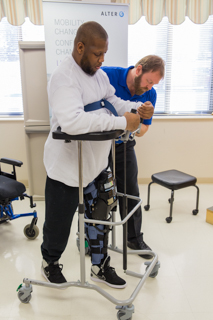The LECOM Institute for Successful Aging, a regional leader in the care of older adults, has begun using a revolutionary new technology in the rehabilitation of its patients.
The Institute’s Inpatient Rehabilitation Unit (IRU) has been using the AlterG Bionic Leg™, the world’s first wearable, robotic mobility assistance device activated by the patient’s intent to move. It gives patients with impaired or diminished mobility resulting from illness or injury the support and confidence they need to take the proverbial next step.
“We’re excited to be the first local health care provider to partner with AlterG and to treat our patients with the leading mobility assistance product,” said Danielle Hansen, D.O., Associate Director of the LECOM Institute for Successful Aging and Vice President of Acute Care Services and Quality/Performance Improvement at Millcreek Community Hospital. “It will be an important complement to our existing programs and treatment options.”
A 37-year-old man who suffered his second stroke and has considerable weakness in his left side is the first patient to be treated at the IRU with the AlterG device. Initially, he could not even turn over in bed on his own and required a mechanical lift.
With the help of the device and the IRU staff, he is making considerable progress in learning to walk again.
 |
| Patrick Beason, a physical therapy assistant, helps Jerome learn to walk again with the help of the AlterG Bionic Leg. The patient had extreme weakness on his left side after suffering a stroke. |
“Wearing the device on his left leg, the patient has been able to walk progressively further with each session,” said Shelly Mayes, Director of Therapy Operations for the IRU. “He’s also walking better, in terms of his balance and being able to walk in more of a straight line. The goal is to help him along gradually so that he’ll be able to walk without the assistance provided by the device.”
The AlterG Bionic Leg helps patients rebuild their neuromuscular pathways and improves active motor learning by providing functional strength and dynamic stability; the leg facilitates increased neuroplasticity (changes in neural pathways and synapses due to changes in behavior, environment and neural processes), thereby helping patients improve stance and gait. The device is ideal for orthopedic physical therapy patients and those recovering from nervous-system related injuries. Potential patients include stroke victims and individuals suffering from Parkinson’s, Multiple Sclerosis (MS) or other degenerative diseases as well as patients with weakness in their lower extremities.
The AlterG device was designed to be lightweight while also providing the assistance needed to more actively participate in sit-to-stand, overground walking and stair-climbing exercises that are critical to the recovery of gait and balance. When the patient begins to stand or ascend a stair, the software’s sensors detect the weight shift and the knee angle changes; the device then applies assistive force in leg extension to help lift the patient. When the patient sits or goes down stairs, the device offers resistance so as to facilitate a smooth, controlled descent.
As the patient is walking, the device allows the leg to move freely during the swing phase while providing added support during the stance phase. The sensitivity of the sensors can be adjusted depending on the specific needs of the patient and as the therapist deems appropriate.
Introduced by AlterG in the summer of 2013, the Bionic Leg can help stroke patients significantly increase their effective balance and their walking speed.
Treatment with the AlterG Bionic Leg is offered at more than 125 hospitals, physical therapy facilities and skilled nursing facilities worldwide. The device received the ninth annual Invention and Entrepreneurship Award in Robotics and Automation (IERA) during the 2013 International Conference on Robotics and Automation in Karlsruhe, Germany.
More about the LECOM Institute for Successful Aging
The institute offers primary care and consultative clinical services in geriatric medicine, including memory assessment, geriatric assessment, balance disorders and falls prevention, mental health, and osteoporosis and geriatric fracture prevention. Its specialists work with primary care physicians, patients and families so as to encourage independence and shared decision-making in outlining an appropriate plan of care. Since its opening in July of 2013, the Institute’s IRU has treated several hundred patients.
The Institute for Successful Aging and Millcreek Community Hospital were the first local health care organizations to be accorded NICHE (Nurses Improving Care for Healthsystem Elders) certification. The national certification was given in recognition of their commitment to providing the highest levels of patient-centered care for older adults.

